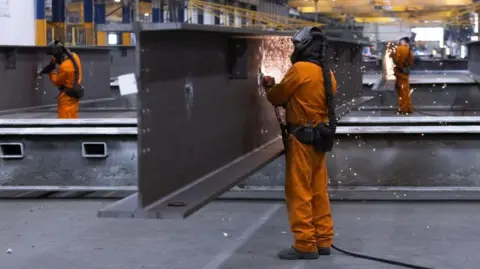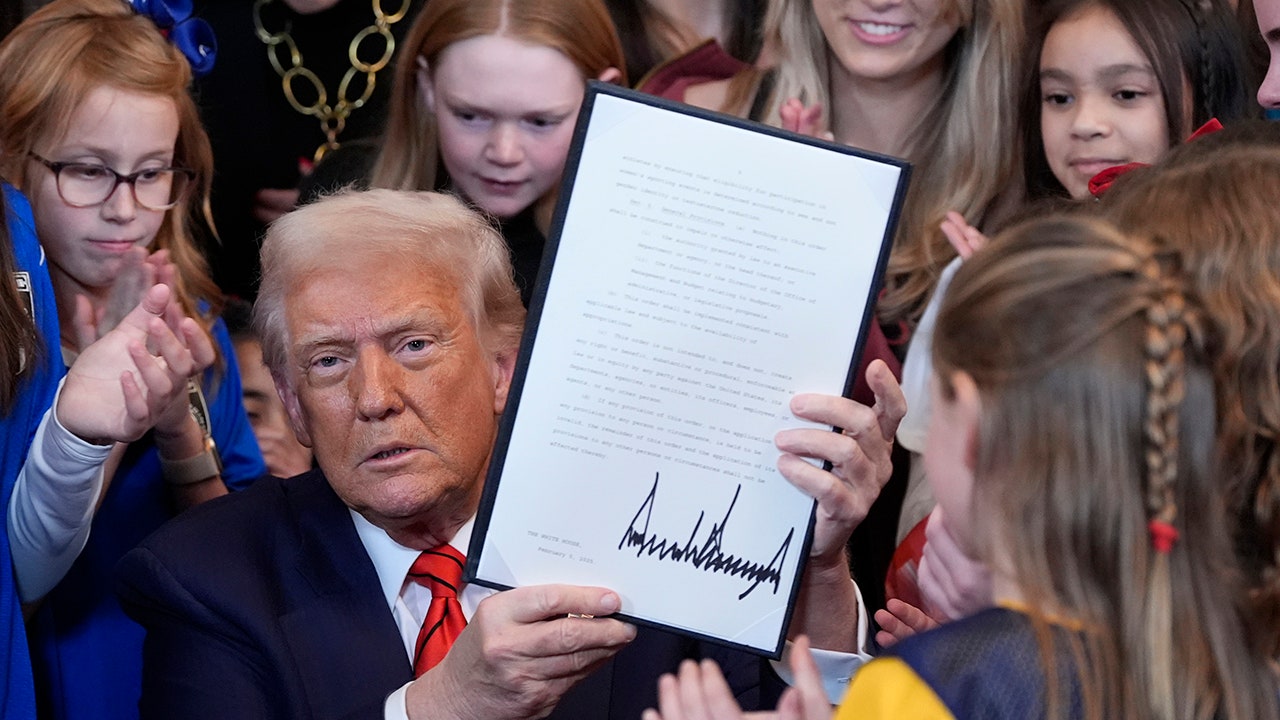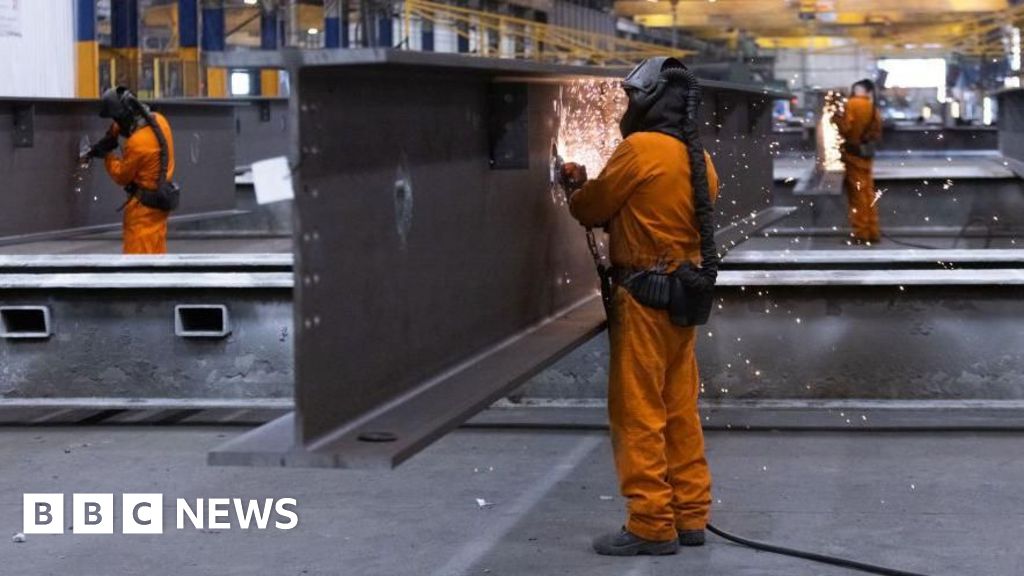The UK and US have a “mutual interest” in negotiating an exemption for the UK from President Donald Trump’s planned export tariffs on steel, the business secretary has said.
Jonathan Reynolds told the BBC the impact of the 25% tariffs which could come into force in March “would be negative for ourselves, it would be negative for the US as well”.
He said the UK was in a different trading position to other nations and could offer “very specialised” steel and aluminium exports the US needs, such as Navy submarine casings that are made in Sheffield while tariffs would push up costs for US taxpayers.
Reynolds’ comments on the Sunday with Laura Kuenssberg programme came after the government promised up to £2.5bn in support for the UK steel industry.
President Trump has said the tariffs would be enforced “without exceptions or exemptions”.
However, Reynolds told the BBC he has had “some very constructive conversations with key people in the Trump administration recognising our relationship is different”, including the special envoy to the UK, Mark Burnett, and the director of the US National Economic Council, Kevin Hasssett.
He told the programme he thought there was a basis for “constructive engagement” between the UK and US but “I’m not saying it’s easy”.
He added: “I appreciate they have a mandate for changing how they approach the issues of trade, but we have got a different argument, a different story to tell, to the EU or to China in relation to our trading relationships,” he said.
 Getty Images
Getty ImagesReynolds was also asked about 2,000 jobs under threat at British Steel’s Scunthorpe plant, where there is a plan to close blast furnaces.
While he said he would expect some guarantees on jobs if the government was investing in the industry, he accepted that there would be a “reduction in head count” with the introduction of new technologies.
As the government committed to provide up to £2.5bn support, it also launched a consultation on the Plan for Steel to look at long-term issues facing the industry.
The government’s Plan for Steel will include measures that seek to bring down the cost of production and encourage the use of domestic steel in infrastructure projects.
Trump’s plan to impose a 25% tariff on all steel imports from 12 March is something the UK sector fears would cost it millions in trade.
Both countries report trade surpluses with each other owing to measurement differences, according to the UK’s Office for National Statistics. Trump had previously said tariffs would target countries that the US run a deficit with.
Shadow business secretary Andrew Griffith said the “uncertainty” the steel industry faced due to US tariffs was something the government “has been entirely silent on when instead they should be talking to the US, our closest trading partner”.
The plan will address issues that have been “holding the industry back for too long”, the Department for Business and Trade (DBT) said.
These include:
- Identifying opportunities to expand steel production
- Encouraging the use of UK-made steel in public infrastructure projects
- Improving scrap processing facilities
- Investing in electric arc furnaces, which are less energy-intensive than blast furnaces and take out the need for high carbon-emitting coke
The consultation will also examine electricity costs for steel companies “to make the UK competitive globally”, and how to protect the sector from unfair trading practices abroad, such as cheap imports flooding the market, the DBT added.
However it did not make a firm commitment to reduce energy bills in launching its plan.
The government has already said it would not retaliate immediately to the tariffs announced by Trump.
UK Steel, which represents the industry, has said the tariffs would be a “devastating blow” that would damage the sector’s £400m-a-year contribution to UK-US trade.
The UK is not a big supplier of steel to the US, with the country accounting for about 10% of British steel exports.
But there are concerns within the industry the tariffs might not just hinder exports to the US, but also lead to excess steel being “dumped” in the UK.
This could occur if other countries no longer exporting to the US decide to offload steel at cheaper prices, which could potentially lead to UK steelmaking businesses being undercut.
Financial support could benefit Scotland and areas such as Scunthorpe, Lincolnshire, Rotherham in South Yorkshire and Redcar in North Yorkshire “which have a strong history of steel production”, the DBT said.
Help will be available through the National Wealth Fund, which partners the government with the private sector and local authorities to finance infrastructure and other projects.
The DBT said it was “wasting no time” supporting UK steel, pointing to the government’s backing of expanding Heathrow Airport, which it said would require 400,000 tonnes of steel.
The UK steel industry has faced heavy job losses in recent years.
Tata Steel said it was replacing traditional blast furnaces with an electric arc furnace at its largest UK site in Port Talbot, Wales. Traditional steelmaking at the site ceased in September, resulting in 2,800 job cuts.
British Steel announced in 2023 it would close blast furnaces in Scunthorpe, and unveiled plans to roll out an electric arc furnace, which requires fewer workers to keep it going, with 2,000 jobs under threat.
The GMB union said the government’s plan to support the “beleaguered” steel industry provided “desperately needed” funding after “years of dithering”.
“As the world becomes more volatile, primary domestic steel making capacity is vital for both our economy and domestic security,” the union’s national secretary Andy Prendergast added.
Gareth Stace, director-general of UK Steel, said the government’s commitment to the industry was “both vital and welcome”.
Information gathered in the consultation will be used to help form a “steel strategy”, to be launched in the spring.
Stace added a robust strategy “has the power to reverse the sector’s decline, particularly as we face increasing competition from imports benefiting from more favourable business conditions”.
Griffiths said he looked forward to seeing a detailed plan, but added “a clear part must be steps to reduce the cost of energy which is placing an intolerable strain on UK steel”.
The Liberal Democrats have said the government urgently needs to prepare for retaliatory tariff. The party’s deputy leader Daisy Cooper said the UK steel industry was being left “dangerously exposed to Donald Trump and the devastating damage his tariffs could do”.















































